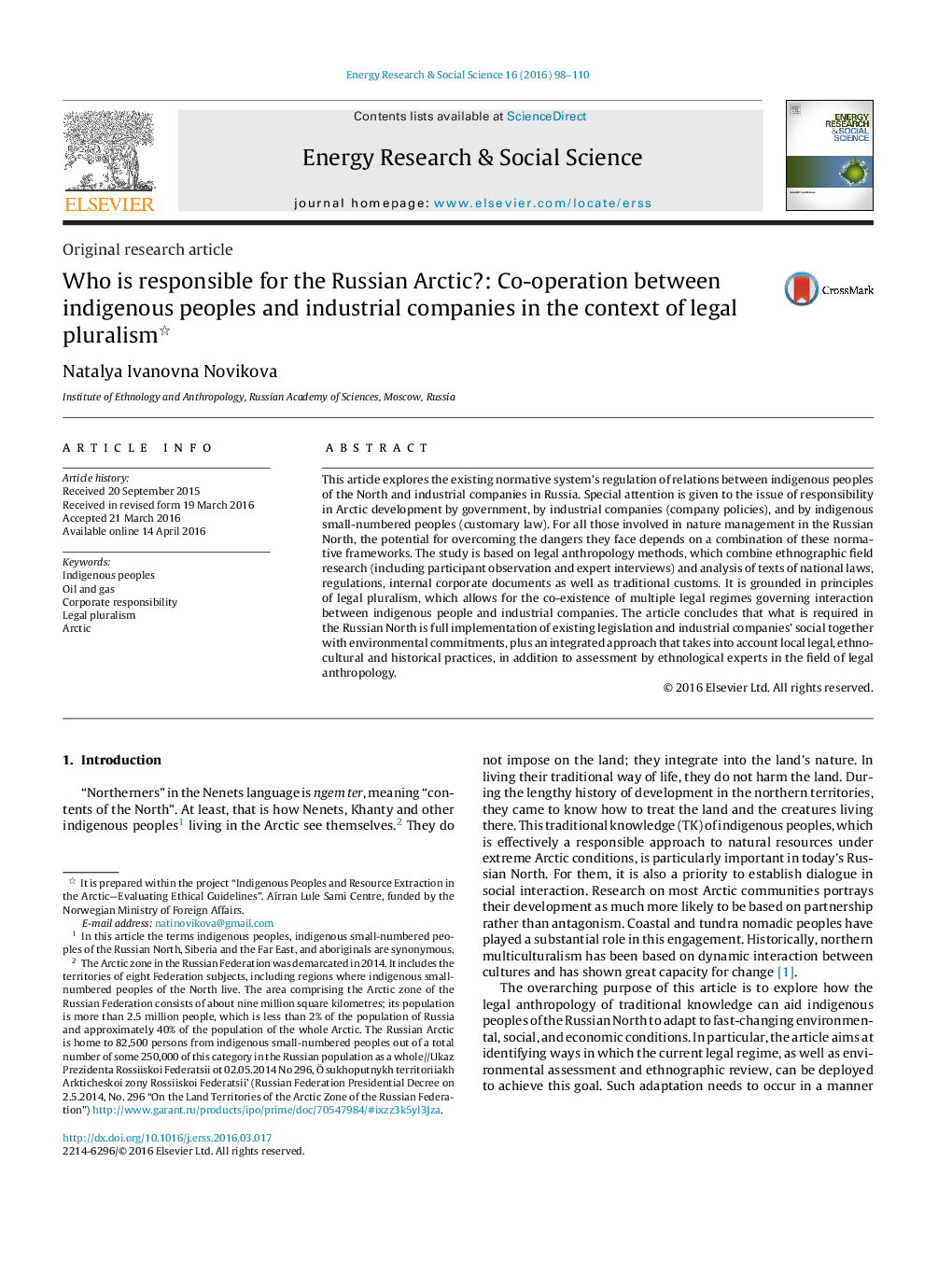| کد مقاله | کد نشریه | سال انتشار | مقاله انگلیسی | نسخه تمام متن |
|---|---|---|---|---|
| 6558127 | 161863 | 2016 | 13 صفحه PDF | دانلود رایگان |
عنوان انگلیسی مقاله ISI
Who is responsible for the Russian Arctic?: Co-operation between indigenous peoples and industrial companies in the context of legal pluralism
ترجمه فارسی عنوان
چه کسی مسئول قطب شمال روسیه است؟: همکاری میان مردم بومی و شرکت های صنعتی در زمینه پلورالیسم حقوقی
دانلود مقاله + سفارش ترجمه
دانلود مقاله ISI انگلیسی
رایگان برای ایرانیان
کلمات کلیدی
مردم بومی، نفت و گاز، مسئولیت سازمانی، پلورالیسم حقوقی، قطب شمال،
ترجمه چکیده
این مقاله به بررسی تنظیم مقررات موجود در سیستم هنجاری روابط میان مردم بومی شمال و شرکت های صنعتی در روسیه می پردازد. توجه ویژه به موضوع مسئولیت در توسعه قطب شمال توسط دولت، توسط شرکت های صنعتی (سیاست های شرکت) و با مردم بومی فقیر (قانون عرفی) است. برای همه کسانی که در مدیریت طبیعت در شمال روسیه حضور دارند، پتانسیل برای غلبه بر خطراتی که در آنها وجود دارد، بستگی به ترکیبی از این چارچوب هنجاری دارد. این مطالعه بر مبنای روش های انسان شناسی قانونی است که ترکیبی از تحقیقات میدانی (شامل مشاهدات شرکت کنندگان و مصاحبه های متخصص) و تجزیه و تحلیل متن قانون های ملی، مقررات، اسناد شرکت های داخلی و همچنین آداب و رسوم سنتی است. این در اصول پلورالیسم حقوقی استوار است که اجازه می دهد تا همکاری چندین رژیم حقوقی در زمینه تعامل میان بومیان و شرکت های صنعتی برقرار شود. این مقاله نتیجه می گیرد که آنچه در شمال روسیه مورد نیاز است، اجرای کامل قوانین موجود و شرکت های صنعتی صنعتی همراه با تعهدات زیست محیطی، به علاوه یک رویکرد یکپارچه است که با توجه به شیوه های قانونی، قومی فرهنگی و تاریخی محلی، علاوه بر ارزیابی توسط کارشناسان قومی در زمینه انسان شناسی حقوق بشر.
موضوعات مرتبط
مهندسی و علوم پایه
مهندسی انرژی
انرژی (عمومی)
چکیده انگلیسی
This article explores the existing normative system's regulation of relations between indigenous peoples of the North and industrial companies in Russia. Special attention is given to the issue of responsibility in Arctic development by government, by industrial companies (company policies), and by indigenous small-numbered peoples (customary law). For all those involved in nature management in the Russian North, the potential for overcoming the dangers they face depends on a combination of these normative frameworks. The study is based on legal anthropology methods, which combine ethnographic field research (including participant observation and expert interviews) and analysis of texts of national laws, regulations, internal corporate documents as well as traditional customs. It is grounded in principles of legal pluralism, which allows for the co-existence of multiple legal regimes governing interaction between indigenous people and industrial companies. The article concludes that what is required in the Russian North is full implementation of existing legislation and industrial companies' social together with environmental commitments, plus an integrated approach that takes into account local legal, ethno-cultural and historical practices, in addition to assessment by ethnological experts in the field of legal anthropology.
ناشر
Database: Elsevier - ScienceDirect (ساینس دایرکت)
Journal: Energy Research & Social Science - Volume 16, June 2016, Pages 98-110
Journal: Energy Research & Social Science - Volume 16, June 2016, Pages 98-110
نویسندگان
Natalya Ivanovna Novikova,
